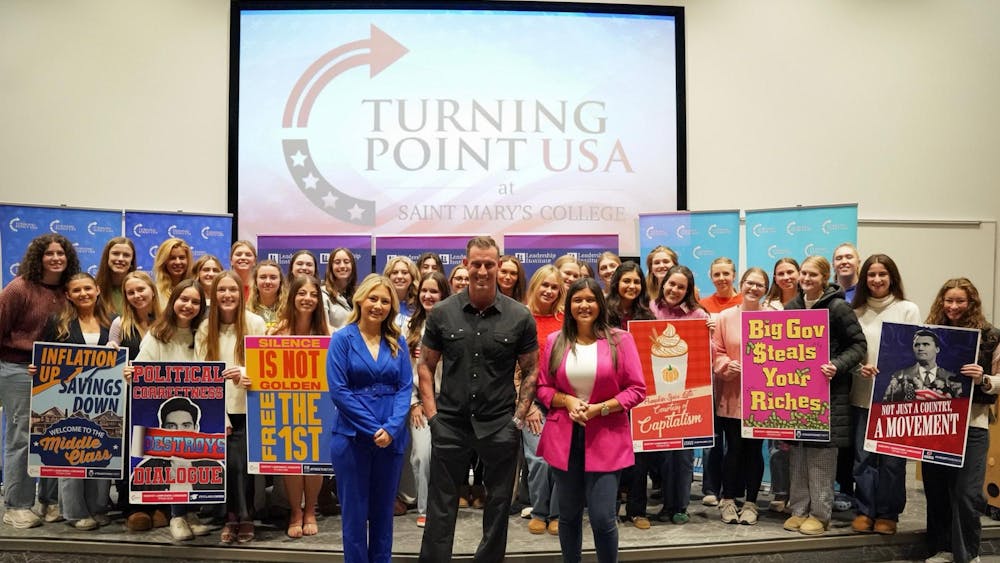The first installment of the semester in the Professors for Lunch series, "Roe at 40: The Supreme Court, Abortion and the Culture War that Followed," drew an audience that filled the Oak Room of South Dining Hall on Jan. 18.
During the lunch event, law professor Amy Barrett discussed the legacy of the landmark Supreme Court case Roe v. Wade that was decided on Jan. 22, 1973.
Barrett, a 1997 graduate of Notre Dame Law School and a former clerk for associate justice Antonin Scalia of the Supreme Court of the United States, said it was important to look at the case and its legacy in light of its coming 40th anniversary.
Barrett said an important question surrounding the issue of abortion is what part of the government should ultimately decide abortion policy. It makes a difference whether the issue is addressed at a state or national level, and whether it is addressed by popularly elected legislators or appointed judges, she said.
"It brings up an issue of judicial review: Does the Court have the capacity to decide that women have the right to obtain an abortion or should it be a matter for state legislatures?" she said. "Would it be better to have this battle in the state legislatures and Congress rather than the Supreme Court?"
Barrett said one problem with the Supreme Court having ruled on the issue is the effect Roe v. Wade has had on the confirmation process of newly appointed Supreme Court justices.
"Republicans are heavily invested in getting judges who will overturn Roe [v. Wade], and Democrats are heavily invested in getting judges who will preserve the central holding of Roe [v. Wade]," Barrett said. "As a result, there have been divisive confirmation battles of a sort not seen before."
The 1992 case of Planned Parenthood v. Casey modified Roe but upheld its central ruling, she said.
"Planned Parenthood v. Casey is a case that alters Roe but preserves the core of Roe," she said. "As of the [Planned Parenthood v.] Casey ruling, before viability the state policy may not pose a substantial obstacle to a woman's obtaining an abortion, but the state can regulate in the interest of the life of the fetus. [Planned Parenthood v.] Casey also stated that after viability the state can regulate with an exception for health of the mother."
After 40 years, the Court is unlikely to overturn Roe v. Wade, she said. The political opposition to the case has for the most part changed tactics from fighting to overturn it to preventing public funding of abortions.
"I think it is very unlikely at this point that the court is going to overturn Roe [v. Wade], or Roe [v. Wade] as curbed by [Planned Parenthood v.] Casey. The fundamental element, that the woman has a right to choose abortion, will probably stand," she said. "The controversy right now is about funding. It's a question of whether abortions will be publicly or privately funded."
Barrett said it is important to recognize the emotional and physical difficulty of carrying an unwanted pregnancy to term.
"Motherhood is a privilege, but it comes at a price," she said. "A woman who wants to become pregnant accepts this price, but in an unplanned pregnancy the woman faces the difficulties of pregnancy unwillingly."
Many women who choose to abort an unwanted pregnancy are both poor and single, Barrett said, and therefore do not have the means to raise a child properly. She said this ought to be an area of focus for addressing the abortion issue.
"I think supporting poor, single mothers would be the best way to reduce the number of abortions in the U.S.," Barrett said.
Barrett also outlined the history of the Roe v. Wade decision and associated cases in the Supreme Court.
At the time of the case, most states prohibited abortion, except in cases wherein it protected the life of the mother, she said. But there was a trend of states liberalizing their abortion laws to permit exceptions for incest, rape and the mother's health.
Roe v. Wade came before the Supreme Court after a woman filed suit against a Texas statute, one of the states with stricter abortion laws, Barrett said. The decision took the abortion issue to the "national stage" and that it marked a dramatic change in public policy about abortion.
"Roe [v. Wade] was a dramatic shift," she said. "The framework of Roe [v. Wade] essentially permitted abortion on demand, and Roe [v. Wade] recognizes no state interest in the life of a fetus."
The decision led to a political backlash that legal scholars have termed "Roe rage."
Barrett said some individuals on the "pro-choice" side of the abortion issue believe the Court overstepped in Roe v. Wade and should have instead allowed more time for states will trend toward more permissive laws. She said these people point to "Roe rage" and its political consequences as evidence.
The 1973 case Doe v. Bolton upheld Roe v. Wade and struck down a Georgia law's restrictions on abortion, Barrett said, including the requirement that a hospital committee approve abortion procedures. A few states maintain restrictions that the Supreme Court has yet to rule on, Barrett said, including the requirement that the mother view an ultrasound that shows the fetus' heartbeat.









